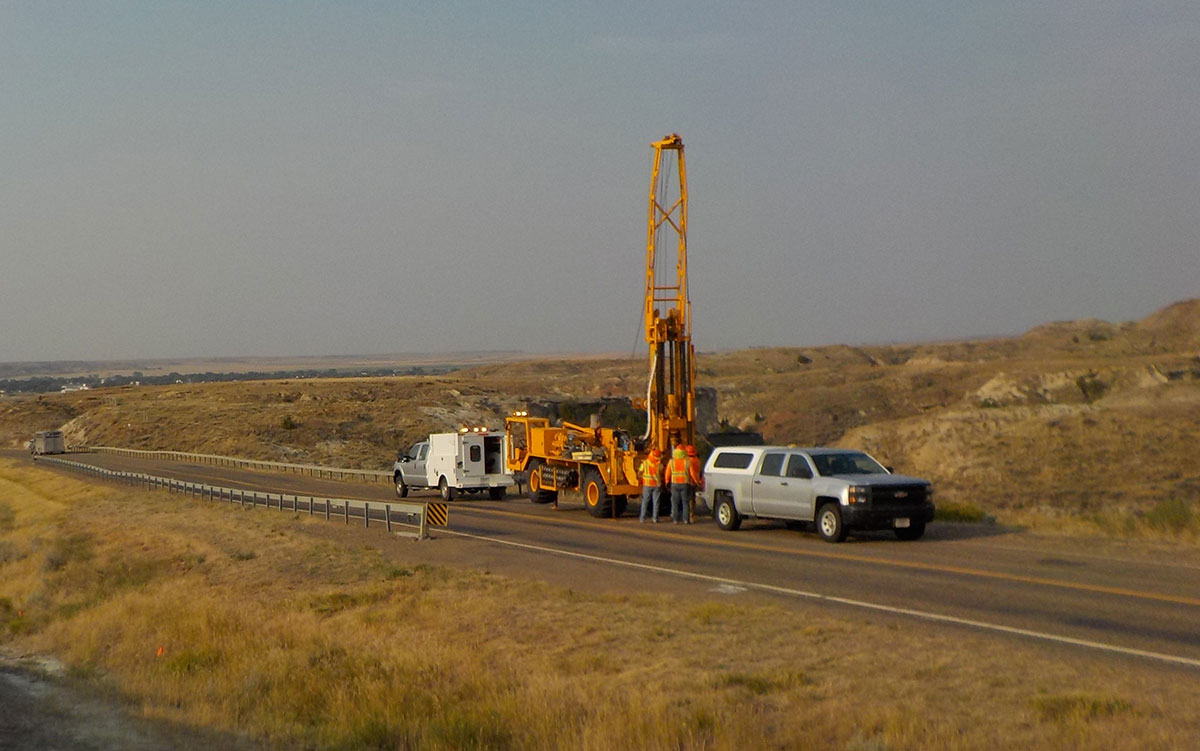October 22, 2020
Innovation of the Month:
Advanced Geotechnical Methods in Exploration (A-GaME)
Last week, we shared Vermont’s story of using cone penetration testing to conduct a subsurface site characterization, which resulted in better data quality and significant cost savings. This week, we will discuss another subsurface tool in the A-GaME toolbox- measurement while drilling (MWD).
MWD uses a rig equipped with multiple sensors to collect data that delivers a continuous profile of the subsurface material. This technique is usable in both rock and soil, so it can be used in a variety of subsurface environments.

The Montana Department of Transportation (MDT) is currently conducting a one-year pilot MWD program for FHWA where the State will purchase, install, and train crews on MWD, collect data on a number of parameters in a variety of geologic soil and rock strata, provide field demonstrations to fellow State and local transportation agencies, and provide FHWA with benefits, limitations, challenges, and lessons learned. MDT has used MWD on six project sites since June 2020 and has also tested it at its controlled field test site. In their evaluation over the past four months, MDT has made several discoveries.
Several parameters measured with MWD have shown promise. MWD was able to identify loose material and a possible void in an area where a sag had formed in a roadway and where they suspect a failed culvert. MDT is using the results of this investigation to identify the best fix for the sag and where ground modification methods and water management should be focused to be most effective. MDT believes this could ultimately result in cost savings during construction.
MWD parameters can also be used to discern differing materials during subsurface investigation. The results give more confidence in the final boring log's representation of subsurface strata. Looking ahead, MDT plans to continue collecting traditional data and compare it to MWD parameters. In the future, MDT may routinely collect real-time drilling measurements, providing more confidence in subsurface interpretation, and potentially reduce sampling efforts, resulting in time and cost savings for investigations.
To learn more about MWD or other techniques to improve your subsurface investigation abilities, please contact Ben Rivers of the FHWA Resource Center or Silas Nichols of the FHWA Office of Infrastructure.
Utah Launches e-Ticketing to Enhance Asset Management
To expand its paperless initiative and improve asset management, the Utah Department of Transportation (UDOT) implemented electronic ticketing for hot-mix asphalt deliveries. Using State Transportation Innovation Council Incentive funds, UDOT completed seven e-Ticketing pilot projects that collected more than 2,900 electronic tickets, representing nearly 70,000 tons of asphalt placed.
In the past, it was difficult to determine where on a project the material covered by an individual ticket was placed. Using e-Ticketing allows UDOT to map the location of materials so it can create an accurate record of its largest asset for pavement management purposes. e-Ticketing also improves safety for UDOT inspectors because they do not have to collect paper tickets from delivery drivers and eliminates the need for crews to total tickets on a jobsite, reducing computational errors. Looking ahead, UDOT plans to expand e-Ticketing for asphalt, as well as pursue it for concrete deliveries.
To learn more about e-Ticketing, please contact Kathryn Weisner with the FHWA Resource Center.
New D-I-Y Website Gives Life-Saving Tools to Local Agencies
Did you know approximately 40 percent of the nation's fatalities occur on locally-owned roads, an average of 12,000 deaths each year? Local Road Safety Plans (LRSPs) are a proven safety countermeasure that local agencies can use to identify and address at-risk locations and deploy cost-effective safety solutions.
FHWA is proud to announce that during the 3rd National Summit for Rural Road Safety, Administrator Nason announced the creation of the Local Road Safety Plan Do-It-Yourself website. Her announcement can be viewed here.
The LRSP DIY site includes resources local agencies and their supporting partners can use to develop these lifesaving plans themselves, beginning with an introduction page to orient users and follows with subsequent pages that walk users through the steps of the LRSP process. The site contains training videos, downloadable templates, "local agency insights" videos where practitioners can learn from their peers, and example plans from other local agencies. Particularly during this period of limited travel, we believe this site can maintain and even enhance FHWA's connection to America's nearly 3,100 counties and over 20,000 cities and towns.
We encourage you to share this site with your local, state, and tribal agency partners. If you have any questions on creating a Local Road Safety Plan, please contact Hillary Isebrands with the FHWA Resource Center or Jerry Roche, FHWA Office of Safety.
Join Us for the EDC-6 Virtual Summit
Registration is open for the EDC-6 summit. This year’s event will be held virtually in three half-day sessions on December 8, 9, and 10.

The summit brings together transportation leaders and frontline professionals responsible for developing and delivering highway projects. We welcome participation from all of our partners–State transportation departments, local agencies, Federal land management agencies, tribes, and industry. The seven initiatives featured at the summit include strategies to increase engagement with people, new applications of products to preserve and repair infrastructure, and improved processes to save time on project delivery and incident management. This event will also feature an innovation showcase that will highlight homegrown ideas being deployed across the country.
To learn more about the events and presentations taking place during the event, you can view the draft agenda here.
About EDC
Every Day Counts, a State-based program of the Federal Highway Administration’s Center for Accelerating Innovation, works with State, local, and private sector partners to encourage the adoption of proven technologies and innovations to shorten and enhance project delivery.


